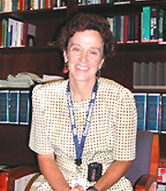

| T H E N I H C A T A L Y S T | J U L Y – A U G U S T 2002 |
|
|
|
| BIOETHICS BONANZAS | ||
 |
 |
Franklin Miller (far left), a special expert in the CC Department of Clinical Bioethics, and Christine Grady, head of the Department’s Section on Human Subjects Research, have been elected Fellows of the Hastings Center– the "bioethicist equivalent of the National Academy," says Department chief Ezekiel Emanuel. |
NIH
Research Festival 2002
|
| ONLINE TECHNOLOGY TRANSFER TRAINING | CANCER DETECTION BIOINFORMATICS |
|
Over the years, NIH intramural research scientists have been actively involved in all aspects of technology transfer. To date, more than 500 Cooperative Research and Development Agreements (CRADAs) and thousands of material transfer agreements (MTAs) have been signed. Additionally, more than 1,500 license agreements have been executed. These collaborations and exchanges have generated a wealth of technologies, including new therapeutic drugs, materials, methods, and devices that have improved the public health. To help educate scientists about technology transfer, NIH has launched the NIH On-Line Technology Transfer Training course. Major areas addressed include MTAs, CRADAs, patents and inventions, licensing, royalties, and ethics. This one time, 40-minute training is required for senior investigators, senior scientists/clinicians, investigators, and adjunct investigators. An abbreviated course is required for fellows, staff scientists/clinicians, and graduate students. The site can be used as an online reference tool on technology transfer for anyone interested. Although originally
designed for NIH intramural scientists, the training is also useful for
anyone who wants or needs to know more about technology transfer, such
as laboratory and administrative staff.
|
The NCI Division of Cancer Prevention (DCP) is holding a workshop on Bioinformatics in Cancer Detection August 6 and 7, Natcher Auditorium. Eric Lander of the Whitehead Institute, Cambridge, Mass., will give the keynote. The list of invitees includes more than 20 experts in bio-informatics of genomics, proteomics, multifactorial, biomarker analysis, and pattern recognition. The goal of the workshop is to determine how bioinformatics may be used in the early detection, risk assessment, and risk reduction of cancer. Register online here. For more information,
contact Robert Negm at 301-435-5015. |